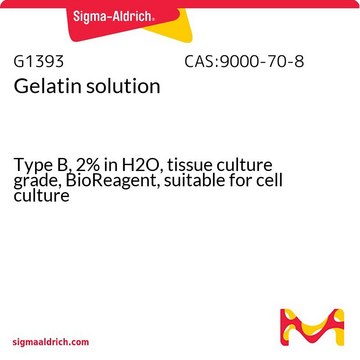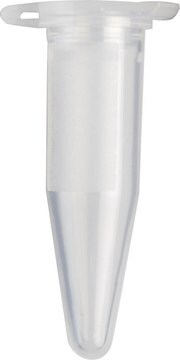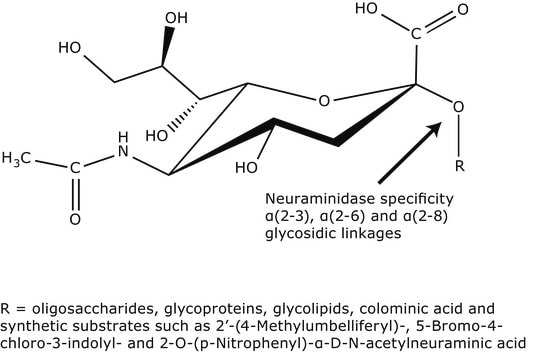추천 제품
product name
UM-SCC-1 Squamous Carcinoma Cell Line, UM-SCC-1 is a unique human head and neck squamous cell carcinoma (HNSCC) cell line isolated from a tumor located on the floor of the mouth of a male patient and is a suitable in vitro model of H&N carcinoma studies.
생물학적 소스
human
Quality Level
기술
cell culture | mammalian: suitable
배송 상태
liquid nitrogen
일반 설명
All UM-SCC cell lines were derived in the lab of Dr. Thomas Carey at the University of Michigan and are exclusively distributed by Merck KGaA, Darmstadt, Germany. Access to UM-SCC cells is limited solely to those officers, employees and students of PURCHASER’s institution who need access to perform research. PURCHASER may not distribute UM-SCC cells or derivatives to third parties. PURCHASER shall comply with all applicable laws in its use and handling of the Product and shall keep it under reasonable safe and secure conditions to prevent unauthorized use or access.
THIS PRODUCT IS ONLY AVAILABLE FOR SALE TO ACADEMIC INSTITUTIONS OR NOT-FOR-PROFIT ENTITIES FOR USE UNDER THIS LIMITED USE LABEL LICENSE. FOR INFORMATION ON COMMERCIAL LICENSING OF UM-SCC CELLS, INCLUDING LICENSING TO COMMERCIAL ENTITIES, PLEASE CONTACT: licensing@emdmillipore.com
Head and neck squamous cell carcinoma (HNSCC) develops from the mucosal linings of the upper aerodigestive tract, comprising 1) the nasal cavity and paranasal sinuses, 2) the nasopharynx, 3) the hypopharynx, larynx, and trachea, and 4) the oral cavity and oropharynx. Squamous cell carcinoma (SCC) is the most frequent malignant tumor of the head and neck region. HNSCC is the sixth leading cancer by incidence worldwide. There are 500,000 new cases a year worldwide and two thirds occur in industrialized nations. It is caused by tobacco and alcohol consumption and infection with high-risk types of human papillomavirus (HPV). SCC often develops from preexisting dysplastic lesions. The five-year survival rate of patients with HNSCC is about 40-50%.
UM-SCC-1 is a unique head and neck squamous carcinoma cell line isolated from the tumor located on the floor of the mouth of a male patient. The cell line is negative for HPV-16 and for HLA-A2, a class I molecule of the major histocompatibility complex (MHC). The UM-SCC-1 cell line is 50% more invasive in vitro and displays a greater propensity for perineural and lymphatic invasion in vivo.
UM-SCC-1 was established at the University of Michigan (1) with written informed consent obtained from the patient and with the approval of the study by the Medical School Institutional Review Board.
Reference:
1) Carey, T., et al. (2012) Genotyping of 73 UM-SCC head and neck squamous cell carcinoma cell lines. Head Neck. 2010 April; 32(4): 417–426.
THIS PRODUCT IS ONLY AVAILABLE FOR SALE TO ACADEMIC INSTITUTIONS OR NOT-FOR-PROFIT ENTITIES FOR USE UNDER THIS LIMITED USE LABEL LICENSE. FOR INFORMATION ON COMMERCIAL LICENSING OF UM-SCC CELLS, INCLUDING LICENSING TO COMMERCIAL ENTITIES, PLEASE CONTACT: licensing@emdmillipore.com
Head and neck squamous cell carcinoma (HNSCC) develops from the mucosal linings of the upper aerodigestive tract, comprising 1) the nasal cavity and paranasal sinuses, 2) the nasopharynx, 3) the hypopharynx, larynx, and trachea, and 4) the oral cavity and oropharynx. Squamous cell carcinoma (SCC) is the most frequent malignant tumor of the head and neck region. HNSCC is the sixth leading cancer by incidence worldwide. There are 500,000 new cases a year worldwide and two thirds occur in industrialized nations. It is caused by tobacco and alcohol consumption and infection with high-risk types of human papillomavirus (HPV). SCC often develops from preexisting dysplastic lesions. The five-year survival rate of patients with HNSCC is about 40-50%.
UM-SCC-1 is a unique head and neck squamous carcinoma cell line isolated from the tumor located on the floor of the mouth of a male patient. The cell line is negative for HPV-16 and for HLA-A2, a class I molecule of the major histocompatibility complex (MHC). The UM-SCC-1 cell line is 50% more invasive in vitro and displays a greater propensity for perineural and lymphatic invasion in vivo.
UM-SCC-1 was established at the University of Michigan (1) with written informed consent obtained from the patient and with the approval of the study by the Medical School Institutional Review Board.
Reference:
1) Carey, T., et al. (2012) Genotyping of 73 UM-SCC head and neck squamous cell carcinoma cell lines. Head Neck. 2010 April; 32(4): 417–426.
성분
1) ≥1X106 viable UM-SCC-1 Squamous Carcinoma Cells: (Catalog No. SCC070). Store in liquid nitrogen.
품질
• Each vial contains ≥ 1X106 viable cells.
• Cells are tested by PCR and are negative for HPV-16, HPV-18, Hepatitis A, B, C and HIV-1 & 2 viruses.
• Cells are negatrive for mycoplasma contamination.
• Each lot of cells are genotyped by STR analysis to verify the unique identity of the cell line.
• Cells are tested by PCR and are negative for HPV-16, HPV-18, Hepatitis A, B, C and HIV-1 & 2 viruses.
• Cells are negatrive for mycoplasma contamination.
• Each lot of cells are genotyped by STR analysis to verify the unique identity of the cell line.
저장 및 안정성
UM-SCC-1 cells should be stored in liquid nitrogen. The cells can be cultured for at least 10 passages after initial thawing without significantly affecting the cell marker expression and functionality.
면책조항
RESEARCH USE ONLY. This product is regulated in France when intended to be used for scientific purposes, including for import and export activities (Article L 1211-1 paragraph 2 of the Public Health Code). The purchaser (i.e. enduser) is required to obtain an import authorization from the France Ministry of Research referred in the Article L1245-5-1 II. of Public Health Code. By ordering this product, you are confirming that you have obtained the proper import authorization.
Storage Class Code
10 - Combustible liquids
WGK
WGK 1
Flash Point (°F)
Not applicable
Flash Point (°C)
Not applicable
시험 성적서(COA)
제품의 로트/배치 번호를 입력하여 시험 성적서(COA)을 검색하십시오. 로트 및 배치 번호는 제품 라벨에 있는 ‘로트’ 또는 ‘배치’라는 용어 뒤에서 찾을 수 있습니다.
Sung-Min Kang et al.
Anticancer research, 38(10), 5747-5757 (2018-10-03)
Few studies have examined the effect of 2'-hydroxycinnamaldehyde (HCA) on head and neck squamous cell carcinoma (HNSCC) cell invasion. This study examined the role of BMP7 on the anti-migration and anti-invasion activity of HCA using HNSCC cells. Matrigel invasion and
Jingyuan Li et al.
Cell death & disease, 11(5), 391-391 (2020-05-24)
Necroptosis is a recently discovered form of programmed cell death (PCD) having necrotic-like morphology. However, its presence and potential impact with respect to head and neck squamous cell carcinoma (HNSCC) are still unknown. The aim of this study was to
자사의 과학자팀은 생명 과학, 재료 과학, 화학 합성, 크로마토그래피, 분석 및 기타 많은 영역을 포함한 모든 과학 분야에 경험이 있습니다..
고객지원팀으로 연락바랍니다.








